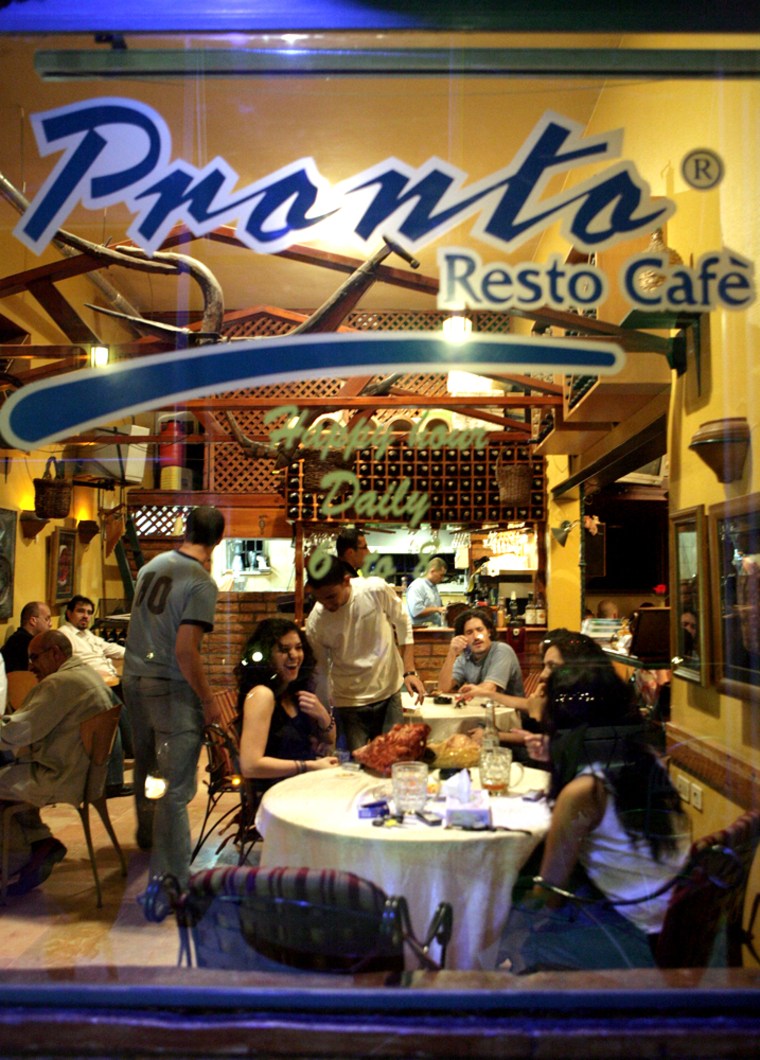Mohammed Kilani, a computer technician, hits the gym every other day to swim laps and lift weights. Umm Hussein, whose husband sells BMWs, takes her kids to the mall to shop, eat in the food court and play video games.
Despite the crippling poverty and frequent violence in the Palestinian territories, the city of Ramallah, the unofficial capital of the West Bank, holds out as an island of middle class existence.
The Islamic militant Hamas is largely absent from this city of 57,000, meaning that Ramallah could provide the best glimpse of what a Palestinian state could look like without Israeli occupation, with its trade and travel bans — if moderate President Mahmoud Abbas’ secular agenda prevails.
While armed militias rule the streets of Nablus, and Gazans largely survive on U.N. food handouts, residents of Ramallah take yoga and Salsa dance classes or sip cappuccinos and beer in mixed groups — behavior that could get them killed 10 miles away.
But even in bourgeois Ramallah, Israel’s military occupation is always near — drivers have to pass army checkpoints to get in and out of town, and troops occasionally raid the city to snatch wanted militants.
“We’re under occupation,” said Sam Bahour, a Palestinian-American business consultant in Ramallah. “It’s just a five-star occupation.”
The area also contains four refugee camps, strongholds of Palestinian gunmen who sometimes intimidate residents. Still, their presence pales in comparison to other West Bank cities.
Many feel more optimistic about the future now that the Hamas-led government has been replaced by a Cabinet of moderates, at least in the West Bank. Abbas replaced a Hamas-Fatah coalition last month with a new government of economists and professors after Hamas violently took over the Gaza Strip.
Blow to devastated Palestinian economy
Last week, the West Bank-based government paid full salaries to tens of thousands of civil servants for the first time in more than a year, after Israel and the international community resumed the flow of aid and tax revenues, which had been frozen after Hamas won a 2006 election.
The boycott dealt a harsh blow to the Palestinian economy, already devastated by years of fighting with Israel. Yet the hardships were never felt as keenly in Ramallah, which became the de facto capital of the West Bank after the establishment of the Palestinian autonomy government there in the mid-1990s under interim peace deals with Israel.
Over the years, business people and international organizations moved to Ramallah, bringing their offices, staff and salaries with them. In the summer, hundreds of Palestinian-Americans vacation in the city, spending dollars and introducing new customs, such as working out at the gym.
In the weight room at Tri Fitness, the city’s swankiest health club, Kilani, 25, took a break from lifting weights to compare Ramallah to his hometown, Jenin, which is next to one of the West Bank’s most militant refugee camps.
In Jenin, coffee shops are only for men, unlike in Ramallah, he said over the crooning of Arab pop singers from the TV sets on the walls. Fewer women in Ramallah wear veils than elsewhere in the West Bank, he added.
However, what keeps him in Ramallah is his career. “Where are the opportunities for IT in Jenin?” he asked. “They’re all here.”
Across the room, Katherine Halteh, 16, was working her abs. Unlike most Palestinians, Halteh said she has permission to travel to Jerusalem, because her mother is an Israeli Arab. Still, she prefers Ramallah.
Jerusalem, claimed by Israelis and Palestinians as a capital, is controlled by Israel and lies just six miles to the south.
Harsh contrast
“The Arabs in Jerusalem don’t do stuff like this,” she said, gesturing at the workout machines. “If they want to, they have to go to Israeli places.”
Ramallah’s rise has coincided with the decline of other West Bank cities like Nablus, the West Bank’s second largest, where armed militias roam the streets.
Hakim Sabbah, 30, said Nablus had three movie theaters when he was a child. Sabbah, who works for a local aid group, Project Hope, said he once acted in a theater group that performed in the streets of Nablus’ old city. “That’s something we don’t do any more,” he said.
The cinemas closed during the first Palestinian uprising in the late 1980s, and continuous street violence has prompted many businesses to relocate to Ramallah or neighboring Jordan, leading to greater unemployment.
Sabbah’s organization recently canceled a youth talent show after the Israeli army invaded the city and imposed a curfew in a hunt for militants, Sabbah said. Security concerns caused the French Cultural Center to cancel all three concerts planned in the city as part of a recent music festival.
A more Western feel
Such worries feel distant from Ramallah’s handful of Western-style coffee shops and bars, where English slang peppers Arabic conversations, men and women chat openly, beer is served despite an Islamic prohibition on alcohol and foreign passports abound. In neighboring villages, such behavior risks a violent reaction from conservative Muslims. In Hamas-controlled Gaza, it would be out of the question.
“I love Ramallah because you have these kinds of places that break gender stereotypes,” said Saleh Hijazi, 24, sharing a table at the Pronto Resto Cafe with four other Palestinian twenty-somethings, all U.S.-educated.
“But I also feel that the place is very elitist,” he added. “You can say that about Ramallah in general.”
Hijazi sipped his beer and lit another Gauloise Blonde cigarette while the girl next to him discussed film theory with a guy in dreadlocks.
“You feel like you’re living in a bubble inside of the West Bank,” Hijazi continued, adding that he recently read a news report about 13 deaths in Gaza.
“I care about what’s happening there,” he said, “but physically and psychologically, it feels very far away.”
